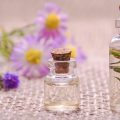If you’re looking for a natural way to improve your skin, you may want to try using essential oils. Essential oils can be used on the skin to help treat a variety of conditions, including acne, eczema, and psoriasis. This article lists some of the best essential oils you can put on your skin to help ease your skin problems.
Essential oils are generally made from flowers, leaves, roots, bark, resin, and other parts of plants. The extraction process is often done through steam distillation or cold pressing, which help preserve the aroma and purity of the oils. There are a wide variety of essential oils available, so you can find one that works best for your needs. Here are 11 essential oils that you can put on your skin.
Essential Oils You Can Put on Your Skin
1. Chamomile
Chamomile helps treat a variety of skin issues. It is a natural, powerful antiseptic agent, making it effective for cuts, scrapes, and other minor injuries. It also helps reduce inflammation and heal burns and rashes. You can add chamomile essential oil to a carrier oil like olive or coconut oil, then apply it directly to the affected area.
Chamomile oil can be used topically for acne and other skin issues like eczema, psoriasis, rosacea, sunburn, and warts. Use it on wounds to prevent scarring and promote healing. Applying the essential oil three times daily will help speed up recovery time and relieve pain.
It is also useful in treating acne-prone skin. It has anti-inflammatory properties that help soothe redness and irritation while balancing sebum production in pores.

2. Clary Sage
-Treats Acne
Clary sage essential oil effectively treats acne by cleansing pores and inhibiting bacteria. It also reduces inflammation due to its anti-inflammatory properties. Moreover, it helps regulate the sebaceous glands responsible for excess production of oils that cause pimples and blackheads.
-Treats Rosacea
Clary sage essential oil is beneficial in treating rosacea since it has antibacterial and astringent properties. The astringent property helps tighten the skin while the antibacterial property fights off the bacteria causing this condition.
-Combats Premature Aging
Clary sage essential oil contains antioxidants that are beneficial for fighting off free radicals that cause premature skin aging.
3. Lavender
Lavender is one of the most popular scents globally, and for a good reason! Not only does it smell great, but it also has many incredible benefits for the body. Apply lavender to your skin to help heal dryness and irritation. It is excellent for keeping your skin healthy by increasing blood flow and circulation to your skin cells which helps promote healthier-looking skin.
4. Tea Tree
Tea tree oil is extracted from a plant native to Australia, Melaleuca Alternifolia, commonly known as the tea tree plant. The oil has antibacterial and antiseptic properties that make it an excellent choice for improving the overall health of your skin – including fighting off acne, rashes, psoriasis, and eczema. It’s also a powerful antioxidant that helps reduce free radical damage, which can contribute to premature aging and prematurely aged or damaged skin. Tea tree’s antimicrobial, anti-inflammatory, and antiseptic properties treat wounds, psoriasis, eczema, and other skin conditions.

5. Cedarwood
Cedarwood is one of the most popular essential oils for treating skin problems, which makes it one of the best essential oils you can put on your skin. It’s used to combat acne, eczema, and psoriasis. Its antifungal properties also help fight fungus infections like ringworm, athlete’s foot, and dandruff.
In addition to its antimicrobial properties, cedarwood oil increases circulation and improves the health of your skin cells. It’s also a natural pain reliever that can help stop itching associated with rashes, insect bites, and other skin irritations.
6. Rosemary
If you have dry, flaky, or itchy skin, rosemary essential oil is can help. This essential oil contains anti-inflammatory properties that help reduce redness and itching. It also has astringent properties that tighten the skin while reducing sebum production. This makes it ideal for acne-prone and oily skin types as well. The anti-inflammatory, antiseptic and antifungal properties in rosemary essential oil make it perfect for treating wounds and insect bites.
Other Essential Oils for Skin Issues
7. Peppermint
Peppermint oil contains menthol that cleanses pores, reduces pore size, and tightens the skin’s texture. Peppermint oil possesses antiseptic properties and can soothe itchy and inflamed skin.
It also stimulates hair follicles and increases blood flow to the scalp. This helps provide nutrients and oxygen to the scalp, encouraging hair growth. This essential oil not only smells good, but it also helps to promote healthy-looking locks. Peppermint contains compounds that are antibacterial and antifungal which help keep the scalp free from harmful inaugural germs while soothing away any irritation or discomfort.
8. Frankincense
The therapeutic properties of frankincense oil make it beneficial in treating skin problems like acne, rashes, sunburn, and psoriasis. Applying frankincense oil on your skin can help heal scaly patches caused by eczema. It reduces the redness and inflammation on the skin caused by acne or rashes, making it useful for treating seborrhea and skin discoloration caused by sunburn or aging.

9. Eucalyptus
Eucalyptus oil may be applied topically to the affected area to get rid of acne breakouts on the face and body. It has antibacterial properties that help remove dirt and kill bacteria that cause acne. It also helps in drying out pimples, thus preventing breakouts. Also, it works as a natural exfoliator that clears away dead skin cells and dirt lodged in pores leading to acne.
10. Lemon
Lemon has powerful antibacterial properties. Using this natural acid as a facial toner can help keep your pores unclogged and free of infection. It’s also a natural astringent that tightens your skin, reducing oil buildup and decreasing the chance of pimples forming.
11. Geranium
It helps to reduce inflammation. Inflammation is the body’s natural response to injury or irritation, but when inflammation becomes chronic and causes damage to healthy tissue, the result is imbalance and disease. Geranium essential oil has strong anti-inflammatory properties, making it helpful in treating eczema, dermatitis, and other inflammatory problems.
It provides antibacterial properties. Because geranium essential oil is antibacterial, it can help treat infections caused by bacteria or fungi and reduce the appearance of blemishes. This makes it helpful in reducing acne breakouts and slowing the development of wrinkles associated with age and sun damage.
Geranium EO also contains antifungal properties. The antifungal properties of geranium make it helpful in treating fungal infections like athlete’s foot.
12. Rosehip Oil
Not an essential oil but a carrier oil. Rosehip oil is a great option for skincare products and helps to reduce the appearance of blemishes and wrinkles. Rosehip oil is made from the seeds of the rose plant. It has been used for centuries to treat skin problems, including acne, wounds, and burns. It is one of the best carrier oils for diluting essential oils, especially for topical applications.
Treatment with rosehip oil can stimulate collagen production, which helps improve the skin’s elasticity. It can also speed up cell regeneration, which means it can help your body heal faster after injury or surgery.

Using Essential Oils on Skin: Caution
The best way to use any of these oils is to dilute them with a carrier oil before applying them to your skin. Carrier oils are oils derived from olive, coconut, sweet almond, and jojoba. Some carrier oils, like rosehip oil, have additional moisturizing properties that can benefit the skin. If you are not sure about mixing essential oils with carrier oils, then check out this post on that.
Do not apply essential oils topically without first diluting them. For example, if you are using essential oils in a bath or on your hair, mix them into the carrier oil before adding it to the water or onto your hair. If you apply undiluted essential oils directly to your skin, you may cause irritation and possible burns.
You can use these oils undiluted only if you use them for aromatherapy or direct inhalation rather than applying them to your skin or scalp.
Also, do a skin patch test on a smaller area of your skin to check for any allergies.
Final Thoughts on the Best Essential Oils for Skin Problems
Conclusion paragraph: Essential oils are a natural way to take care of your skin without the use of harsh chemicals. You can use them after a bath or shower, as a moisturizer, or even as a natural anti-acne treatment.
If you’re looking for some of the best essential oils you can put on your skin, hope this list has helped.
However, note that not all essential oils work well on sensitive or irritated skin so please consult with your healthcare professional before using any new products.
References
Cardia, G., Silva-Filho, S. E., Silva, E. L., Uchida, N. S., Cavalcante, H., Cassarotti, L. L., Salvadego, V., Spironello, R. A., Bersani-Amado, C. A., & Cuman, R. (2018). Effect of Lavender (Lavandula angustifolia) Essential Oil on Acute Inflammatory Response. Evidence-based complementary and alternative medicine : eCAM, 2018, 1413940. https://doi.org/10.1155/2018/1413940
Winkelman W. J. (2018). Aromatherapy, botanicals, and essential oils in acne. Clinics in dermatology, 36(3), 299–305. https://doi.org/10.1016/j.clindermatol.2018.03.004
https://www.ncbi.nlm.nih.gov/pmc/articles/PMC5796020/





